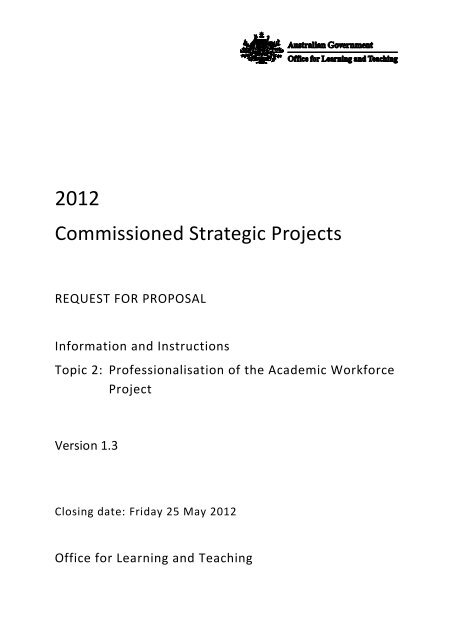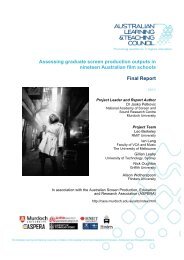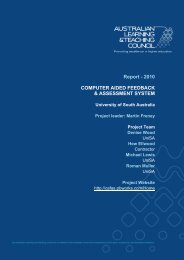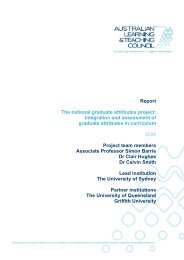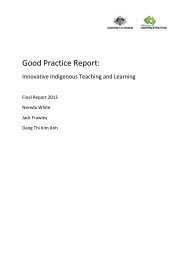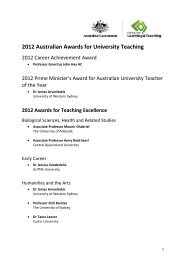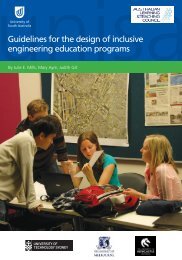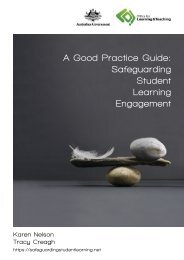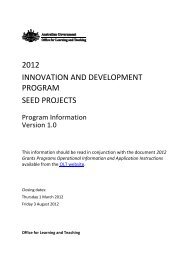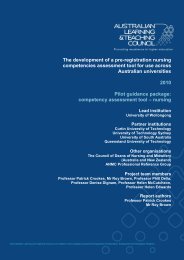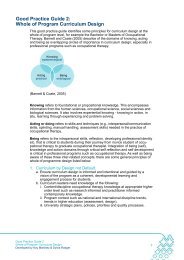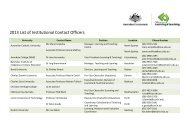Commissioned Strategic Projects - Office for Learning and Teaching
Commissioned Strategic Projects - Office for Learning and Teaching
Commissioned Strategic Projects - Office for Learning and Teaching
You also want an ePaper? Increase the reach of your titles
YUMPU automatically turns print PDFs into web optimized ePapers that Google loves.
2012<br />
<strong>Commissioned</strong> <strong>Strategic</strong> <strong>Projects</strong><br />
REQUEST FOR PROPOSAL<br />
In<strong>for</strong>mation <strong>and</strong> Instructions<br />
Topic 2: Professionalisation of the Academic Work<strong>for</strong>ce<br />
Project<br />
Version 1.3<br />
Closing date: Friday 25 May 2012<br />
<strong>Office</strong> <strong>for</strong> <strong>Learning</strong> <strong>and</strong> <strong>Teaching</strong>
Contents<br />
1 INFORMATION AND ELIGIBILITY ..................................................................................................... 1<br />
1.1 The <strong>Office</strong> <strong>for</strong> <strong>Learning</strong> <strong>and</strong> <strong>Teaching</strong> ..................................................................................... 1<br />
1.2 <strong>Strategic</strong> <strong>Commissioned</strong> Work ................................................................................................ 1<br />
2 COMMISSIONED PROJECT – PROFESSIONALISATION OF THE ACADEMIC WORKFORCE ................ 2<br />
2.1 Introduction ............................................................................................................................ 2<br />
2.2 Context .................................................................................................................................... 2<br />
3 THE PROJECT ................................................................................................................................... 2<br />
3.1 Building upon existing work funded by the OLT <strong>and</strong> its predecessor bodies ......................... 3<br />
3.2 Project Deliverables ................................................................................................................ 4<br />
4 ASSESSMENT OF PROJECT PROPOSAL ............................................................................................ 5<br />
4.1 Assessment Criteria ................................................................................................................ 5<br />
5 OPERATIONAL INFORMATION ........................................................................................................ 6<br />
5.1 Funding Agreement ................................................................................................................ 6<br />
5.2 Payment of Grant .................................................................................................................... 6<br />
5.3 Per<strong>for</strong>mance ........................................................................................................................... 7<br />
5.4 Supporting In<strong>for</strong>mation .......................................................................................................... 7<br />
5.5 Reporting <strong>and</strong> Accountability ................................................................................................. 7<br />
5.6 Dissemination ......................................................................................................................... 8<br />
5.7 Reference Groups <strong>and</strong> Project Advice/Support ...................................................................... 8<br />
5.8 Intellectual Property ............................................................................................................... 9<br />
5.9 Publication ............................................................................................................................ 10<br />
5.10 Privacy <strong>and</strong> Confidential In<strong>for</strong>mation ................................................................................... 10<br />
6 APPLICATION INFORMATION AND INSTRUCTIONS ...................................................................... 12<br />
6.1 Overview ............................................................................................................................... 12<br />
6.2 Eligibility ................................................................................................................................ 12<br />
6.3 Funding ................................................................................................................................. 12<br />
6.4 Project Duration .................................................................................................................... 12<br />
6.5 Timelines ............................................................................................................................... 12<br />
6.6 Project Leaders <strong>and</strong> Project Teams ....................................................................................... 13<br />
6.7 Collaborative <strong>Projects</strong> ........................................................................................................... 13<br />
6.8 Single Institution <strong>Projects</strong> ..................................................................................................... 13
6.9 Financials ............................................................................................................................... 14<br />
6.10 Lodgement <strong>and</strong> Processing ................................................................................................... 15<br />
6.11 Proposal Format <strong>and</strong> Inclusions ............................................................................................ 16<br />
6.12 Closing Date .......................................................................................................................... 16<br />
6.13 Problems in Submitting an Application on the grants portal ............................................... 17<br />
7 APPENDIX 1: INSTRUCTIONS FOR USING THE GRANTS PORTAL ................................................... 18<br />
7.1 Accessing the Online Grants Portal ....................................................................................... 18<br />
7.2 OLT Grants Portal Login ........................................................................................................ 18<br />
7.3 Application Form In<strong>for</strong>mation .............................................................................................. 19<br />
7.4 Contact details <strong>for</strong>m ............................................................................................................. 21<br />
7.5 Attachments sent through the Grants Portal ....................................................................... 21<br />
8 APPENDIX 2: APPLICATION CHECKLIST ......................................................................................... 22<br />
9 APPENDIX 3 EXAMPLES OF PROJECTS ........................................................................................... 23
1 INFORMATION AND ELIGIBILITY<br />
The purpose of this document is to set out the requirements <strong>for</strong> proposals <strong>for</strong> commissioned work <strong>for</strong><br />
Topic 2 –Professionalisation of the Academic Work<strong>for</strong>ce.<br />
1.1 The <strong>Office</strong> <strong>for</strong> <strong>Learning</strong> <strong>and</strong> <strong>Teaching</strong><br />
The <strong>Office</strong> <strong>for</strong> <strong>Learning</strong> <strong>and</strong> <strong>Teaching</strong> (OLT) in the Department of Industry, Innovation, Science <strong>and</strong><br />
Research <strong>and</strong> Tertiary Education (the Department) promotes <strong>and</strong> supports change in higher education<br />
institutions <strong>for</strong> the enhancement of learning <strong>and</strong> teaching through the Grants, Fellowships, Awards<br />
programs <strong>and</strong> commissioned work.<br />
These grants are paid under the Promoting Excellence in <strong>Learning</strong> <strong>and</strong> <strong>Teaching</strong> in Higher Education<br />
(PELTHE) Program under Part 2 – Other Grants of the Higher Education Support Act 2003.<br />
The aim of the Grants programs is to provide funding <strong>for</strong> academics <strong>and</strong> professional staff to<br />
investigate, develop <strong>and</strong> implement innovations in learning <strong>and</strong> teaching. Grants facilitate scholarship<br />
<strong>and</strong> research into learning <strong>and</strong> teaching, <strong>and</strong> promote systemic change in the sector. They play an<br />
important role in providing esteem <strong>for</strong> learning <strong>and</strong> teaching scholarship <strong>and</strong> practice.<br />
The Fellowships program advances learning <strong>and</strong> teaching in higher education by supporting a group of<br />
leading educators to undertake strategic, high-profile activities in areas of importance to the sector.<br />
Through their fellowship activities, Fellows have a positive <strong>and</strong> lasting influence <strong>and</strong> impact on higher<br />
education practice in Australia. Fellowship selection is based on individuals’ demonstrated leadership<br />
capacity in higher education.<br />
The Australian Awards <strong>for</strong> University <strong>Teaching</strong> are designed to recognise quality teaching practice <strong>and</strong><br />
outst<strong>and</strong>ing contributions to student learning. It is intended that recipients, with the support of their<br />
institutions, will contribute to systemic change in learning <strong>and</strong> teaching through ongoing knowledge<br />
sharing <strong>and</strong> dissemination, <strong>for</strong> example, presentations within the learning <strong>and</strong> teaching community,<br />
collegial mentoring, pairing <strong>and</strong> networking, <strong>and</strong> involvement in university <strong>and</strong> higher education<br />
committees.<br />
1.2 <strong>Strategic</strong> <strong>Commissioned</strong> Work<br />
The OLT occasionally commissions strategic projects in response to key issues in the Australian higher<br />
education sector with the guidance of OLT’s <strong>Strategic</strong> Advisory Committee.<br />
As these are larger strategic projects of national interest, we would anticipate proposals <strong>for</strong> funding of<br />
$220,000 <strong>and</strong> above.<br />
The OLT may award one or more grants to address a strategic topic.<br />
1
2 COMMISSIONED PROJECT – PROFESSIONALISATION OF<br />
THE ACADEMIC WORKFORCE<br />
2.1 Introduction<br />
The dem<strong>and</strong> driven system of higher education has created a new playing field with a record intake of<br />
new students in 2012 as caps are removed on government-funded places. Further, the Government is<br />
seeking to increase the percentage of 25 to 34-year-olds with a bachelor degree to 40 per cent by<br />
2025.<br />
The significant growth in higher education means it is more important than ever <strong>for</strong> Australia to<br />
maintain its national <strong>and</strong> international reputation <strong>for</strong> delivering high quality higher education. Greater<br />
consideration is now required regarding ways to achieve effective teaching to a more diverse <strong>and</strong><br />
significantly larger student cohort which go beyond considering online delivery as the most viable<br />
option. Additionally, maintaining the competitiveness of Australia’s higher education sector <strong>and</strong><br />
attractiveness to international students will rely increasingly on its reputation <strong>for</strong> academic integrity<br />
<strong>and</strong> its ability to deliver a positive student experience.<br />
As the increasing diversity of the student body is matched by an increasing diversity of staff,<br />
universities need to take these factors into consideration as they induct <strong>and</strong> prepare the academic<br />
work<strong>for</strong>ce <strong>for</strong> the diversity of their student bodies.<br />
2.2 Context<br />
To enable effective learning by students to prepare them <strong>for</strong> the economy of the twenty-first century<br />
all academics, but particularly those in teaching intensive positions, need to embrace the new digital<br />
age. This requires an altered approach <strong>and</strong> commensurate capacity building in relation to content, to<br />
assessment <strong>and</strong> to pedagogy.<br />
3 THE PROJECT<br />
The outcomes of this commissioned work are intended:<br />
<br />
<br />
<br />
<br />
<br />
<br />
to articulate <strong>and</strong> embed within its processes what constitutes a clear underst<strong>and</strong>ing of<br />
effective teaching<br />
to provide some benchmarks <strong>for</strong> recognising <strong>and</strong> embedding effective teaching<br />
to inspire <strong>and</strong> encourage those working in universities to be effective teachers<br />
to align excellence in teaching with excellence in research; to 'eliminate the need to talk about<br />
a nexus' 1<br />
to demonstrate developmental pathways <strong>for</strong> academics who are also teachers, <strong>and</strong> <strong>for</strong><br />
teachers wishing to pursue careers as academics<br />
to provide support <strong>for</strong> sessional <strong>and</strong> casual staff who increasingly make up the bulk of<br />
undergraduate teaching.<br />
1 Bennett, D. 2010, personal correspondence<br />
2
3.1 Building upon existing work funded by the OLT <strong>and</strong> its<br />
predecessor bodies<br />
There is a considerable body of work funded by the Australian <strong>Learning</strong> <strong>and</strong> <strong>Teaching</strong> Council (ALTC)<br />
<strong>and</strong> more broadly, either completed or underway, which can support <strong>and</strong> complement this next phase<br />
of higher education teaching development. <strong>Projects</strong> have developed systems <strong>and</strong> resources <strong>for</strong> peer<br />
review <strong>and</strong> have examined the impact of teaching awards. Other projects have devised methods <strong>for</strong><br />
evaluating the effectiveness of teaching development programs, including tertiary teaching programs,<br />
<strong>and</strong> have distilled principles <strong>for</strong> successful leadership of sustainable improvement in learning <strong>and</strong><br />
teaching. The teaching practices of award winners <strong>and</strong> teaching fellows are a rich source of case<br />
studies <strong>and</strong> exemplars. These have not yet been collected <strong>and</strong> analysed in any systematic way.<br />
The final report should include:<br />
<br />
<br />
<br />
a summative evaluation, describing excellent teaching practice, <strong>and</strong> what constitutes<br />
successful teaching <strong>and</strong> how these capacities might be developed in new <strong>and</strong> experienced<br />
academics<br />
literature reviews, which provide an international context about what constitutes effective<br />
kinds of teaching.<br />
case studies of:<br />
- award winners <strong>and</strong> teaching fellows, including students' comments <strong>and</strong> evaluation data<br />
(available from the nomination documents) about effective teaching; 2 particularly in<br />
differing teaching <strong>and</strong> learning environments such as workplace learning, Web 2.0<br />
environments or online<br />
- early career academics nominated by award winners or fellows, to obtain a mix of<br />
established <strong>and</strong> new practitioners’ experiences about effective teaching in contemporary<br />
higher education<br />
- teachers who have demonstrated pedagogical diversity in their teaching of students from<br />
diverse backgrounds, including rural <strong>and</strong> remote, low SES, Indigenous <strong>and</strong> non-English<br />
speaking.<br />
A possible framework <strong>for</strong> the case studies, based on the teaching awards criteria, follows:<br />
1. approaches to teaching, supervision <strong>and</strong> assessment that likely influence, motivate <strong>and</strong> inspire<br />
students to learn the knowledge intended through their courses<br />
2. development of curricula <strong>and</strong> resources that reflect current <strong>and</strong> comprehensive accounts of the<br />
discipline or field of what is to be learnt<br />
3. the enactment of curricula <strong>and</strong> use of resources that directly assist students experiencing of the<br />
knowledge of the discipline or field that is to be learnt<br />
4. the selection <strong>and</strong> use of teaching strategies <strong>and</strong> pedagogies that are well aligned to enrich<br />
students’ learning <strong>and</strong> are appropriate to specific individual/cohort needs including equity groups<br />
such as Indigenous students <strong>and</strong> students from a low SES<br />
5. approaches to assessment <strong>and</strong> feedback that foster independent <strong>and</strong> interdependence in learning<br />
6. orientations <strong>and</strong> approaches to teaching that respect <strong>and</strong> support <strong>for</strong> the development of<br />
students as individuals<br />
7. engagement in scholarly activities that have influenced <strong>and</strong> enhanced learning <strong>and</strong> teaching<br />
experiences.<br />
2 permission to review <strong>and</strong> publish material from nominations would have to be obtained from recipients <strong>and</strong> institutions as<br />
ALTC/OLT does not own the IP in these documents.<br />
3
3.2 Project Deliverables<br />
There should be at least three high level outcomes <strong>for</strong> the project.<br />
1. A final report targeted at those in the learning <strong>and</strong> teaching community who could utilise the<br />
report as a reference <strong>and</strong> framework. The final report should follow the structure mentioned<br />
above of a summative evaluation, a literature review <strong>and</strong> case studies.<br />
2. A high level summary which utilises ‘layperson’ terminology <strong>and</strong> is suitable <strong>for</strong> a variety of<br />
audiences.<br />
3. Easily accessible resources to assist in developing <strong>and</strong> disseminating good practice <strong>and</strong> should<br />
be suitable <strong>for</strong> a range of academic teachers including sessional staff, academics on probation,<br />
early-career academics, HR managers <strong>and</strong> senior executive staff. The resources should be<br />
presented in ways that meet their needs, addresses concerns they are confronting <strong>and</strong> are<br />
readily accessible <strong>for</strong> them. These resources should include case studies, presentations,<br />
exemplars, tools, checklists <strong>and</strong> should be presented as website <strong>and</strong> multimedia.<br />
A selection of recent <strong>and</strong> current OLT-funded projects on this topic can be found in Appendix 3.<br />
The full reporting requirements are listed in section 5.5 on page 7.<br />
4
4 ASSESSMENT OF PROJECT PROPOSAL<br />
Applications <strong>for</strong> commissioned work grants will be assessed by the OLT <strong>and</strong> a panel of experienced<br />
academics with expert knowledge about the proposed project.<br />
The OLT reserves the right to ask <strong>for</strong> a proposal to be modified <strong>and</strong>/or re-submitted <strong>for</strong> decision.<br />
Please note in assessing the proposal, the in<strong>for</strong>mation may be shared with other Commonwealth<br />
agencies, organisations <strong>and</strong> individuals, including those you identify in the proposals to substantiate<br />
any claims or statements that you make, to verify the capacity of your organisation to manage<br />
Commonwealth funds <strong>and</strong> <strong>for</strong> general comments on the viability of your proposed project.<br />
4.1 Assessment Criteria<br />
Applications <strong>for</strong> funding <strong>for</strong> <strong>Commissioned</strong> <strong>Strategic</strong> <strong>Projects</strong> should demonstrate the following:<br />
Project Outcomes <strong>and</strong> Rationale<br />
Clearly articulated outcomes <strong>and</strong> a clear argument demonstrating how the project will contribute to<br />
the outcomes as stated in Section 3.<br />
Approach<br />
<br />
<br />
<br />
<br />
A strong theoretical framework that is grounded in the literature<br />
A set of strategies which is considered, coherent <strong>and</strong> appropriate to the outcomes the project<br />
is designed to achieve<br />
An approach that is in general alignment with the commitments of the OLT<br />
Alignment between plans <strong>for</strong> the dissemination/embedding of the successful strategies <strong>and</strong><br />
outcomes <strong>and</strong> the project design.<br />
Value/Need <strong>for</strong> Project<br />
Potential usefulness of the project <strong>and</strong> its outcomes to any of the following:<br />
<br />
<br />
the sector as a whole<br />
the development of national approaches or policies related to learning <strong>and</strong> teaching in higher<br />
education.<br />
Ways in which the project both utilises <strong>and</strong> advances existing national policies or knowledge relevant<br />
to excellence in teaching.<br />
Project Management<br />
<br />
<br />
Budget<br />
A thorough approach to project management, including a preliminary allocation of<br />
responsibilities among the team members.<br />
The quality <strong>and</strong> timeliness of the project leader’s previous OLT work may be taken into<br />
account when considering applications <strong>for</strong> funding.<br />
A budget justification that is appropriate to the project outcomes <strong>and</strong> importance.<br />
5
5 OPERATIONAL INFORMATION<br />
5.1 Funding Agreement<br />
Lead institutions will be required to enter into an agreement with the Department managed by the<br />
OLT. If there is any inconsistency between the agreement <strong>and</strong> these instructions, the terms of the<br />
agreement will prevail. Where a proposal from a consortium is approved, the OLT will enter into an<br />
agreement with the lead institution only.<br />
The conditions of the grant will be specified in the agreement. The agreement will specify:<br />
<br />
<br />
<br />
<br />
<br />
<br />
the outcomes of the project to be achieved<br />
the payment arrangements<br />
conditions of the grant including financial <strong>and</strong> per<strong>for</strong>mance reporting requirements<br />
requirements regarding variation to the agreement<br />
acquittal of grants <strong>and</strong><br />
other related issues.<br />
The funding agreement will be <strong>for</strong> a period of twelve months.<br />
The initial grant payment must occur by end June in the year <strong>for</strong> which the grant was approved.<br />
If a project is designed to go beyond 12 months the funding <strong>for</strong> the out years will be given provisional<br />
approval only. Should a project not be progressing well or the recipient institution request noncontinuance,<br />
the OLT can determine not to fund any extension or negotiate a new agreement with a<br />
different institution <strong>for</strong> completion of the project.<br />
A model funding agreement is available on the OLT <strong>Commissioned</strong> <strong>Projects</strong> section of the OLT website.<br />
5.2 Payment of Grant<br />
The funding agreement will contain the in<strong>for</strong>mation on payment instalments linked to agreed project<br />
stages <strong>and</strong> deliverables.<br />
Payments will be made via UniPay, the Department’s internal payments portal. Payments will be made<br />
to the account officially designated by the institution <strong>and</strong> the OLT will not consider any requests to pay<br />
into alternate bank accounts. Payments in UniPay are made on a twice-monthly basis as per the<br />
Department’s st<strong>and</strong>ard grants payment process. The payment will be identified as a separate line<br />
item in the Institution Payment Summary in the Other Grants Category as the Promotion of Excellence<br />
in <strong>Learning</strong> <strong>and</strong> <strong>Teaching</strong> in Higher Education program.<br />
Collaborative <strong>Projects</strong><br />
For projects involving a consortium of institutions/organisations, the grant will be paid to the lead<br />
institution (recipient institution) which will be responsible <strong>for</strong> the management <strong>and</strong> acquittal of the<br />
funding <strong>and</strong> the deliverables from the project. When seeking funding <strong>for</strong> a consortium, care should be<br />
taken to ensure the costs associated with the type of collaboration proposed are adequately<br />
addressed.<br />
6
5.3 Per<strong>for</strong>mance<br />
The recipient institution is responsible to the OLT <strong>for</strong> managing the per<strong>for</strong>mance of the project<br />
through the project leader(s). This responsibility is expressed through institutional sign-off on project<br />
proposals, funding agreements <strong>and</strong> per<strong>for</strong>mance reporting.<br />
Should a project leader need to withdraw from the project, written notification should be provided to<br />
the OLT with in<strong>for</strong>mation on how the project will continue to be supported by the lead institution.<br />
Collaborations, Partnerships <strong>and</strong> Other Roles<br />
Proposed changes in partner institutions, <strong>for</strong> example withdrawal or addition of a partner during the<br />
project, must be supported by the DVC (Academic) or equivalent, of the institution/s concerned <strong>and</strong><br />
written notification of the change <strong>and</strong> endorsement be provided to the OLT.<br />
5.4 Supporting In<strong>for</strong>mation<br />
Applicants are advised to familiarise themselves with the resources available at the Managing Your<br />
Project webpage on the OLT website, in particular, the document Project Management In<strong>for</strong>mation .<br />
5.5 Reporting <strong>and</strong> Accountability<br />
The grant recipient must deliver outcomes in accordance with the requirements in this document <strong>and</strong><br />
a signed funding agreement.<br />
The following reports must be provided as per a signed funding agreement:<br />
<br />
<br />
<br />
<br />
Progress Report (must be provided at six months into the agreement)<br />
Final Report <strong>and</strong> high level summary<br />
Evaluation of the Project<br />
Financial Acquittal Statement.<br />
The grant reporting <strong>and</strong> deliverables will be subject to confirmation by the OLTprior to entering into a<br />
funding agreement.<br />
The project leader may be asked to present the project findings to the OLT’s <strong>Strategic</strong> Advisory<br />
Committee or an OLT nominee <strong>for</strong> feedback, prior to the project completion date.<br />
Institutions are required to provide regular progress reports <strong>and</strong> a final written report on the conduct<br />
of the project, as specified in the funding agreement. These reports must be signed by the Vice-<br />
Chancellor, or equivalent, or their delegate.<br />
Ongoing evaluation must be included as part of the project in its various stages <strong>and</strong> be a role of the<br />
reference group. In addition, recipients of grants in excess of $120,000 are required to commission a<br />
<strong>for</strong>mal independent evaluation of the project. This may be funded from the OLT grant <strong>and</strong> should be<br />
included in the project proposal’s budget.<br />
When a project team is not able to meet the milestones or the date <strong>for</strong> completion of the project, the<br />
project leader must seek an extension in writing at least two weeks be<strong>for</strong>e the due date from the OLT.<br />
Financial Reporting<br />
Funding must be used <strong>for</strong> the purposes specified in the funding agreement. Financial reporting <strong>and</strong><br />
acquittal processes provide assurance of this to the OLT.<br />
7
For projects designed to go beyond twelve months’ duration, a financial statement must be provided<br />
with the specified deliverables at the agreed milestones of the project.<br />
On completion of the project a full financial statement complying with the conditions in the funding<br />
agreement must be provided by the agreed completion date (the date when all reporting <strong>and</strong> acquittal<br />
of funding should have been finalised).<br />
The financial acquittal should itemise how funds were used during the course of the project <strong>and</strong> be<br />
signed as true <strong>and</strong> accurate by the authorised person within the lead institution as specified in the<br />
funding agreement <strong>and</strong> countersigned by the project leader.<br />
Any funds not expended at the end of the project must be returned to the OLT. The OLT retains the<br />
right to reclaim funds if the recipient institution fails to fulfil the conditions of these instructions or the<br />
funding agreement or where an overpayment has occurred.<br />
Final Project Report<br />
The final report should be comprehensive <strong>and</strong> document the ways in which the project outcomes have<br />
been achieved. There are two parts in the final report:<br />
1. Part 1 is a report on the study designed to in<strong>for</strong>m stakeholders <strong>and</strong> other interested parties<br />
about the project. Part 1 will be published <strong>and</strong> the OLT will allocate an ISSN/ISBN.<br />
2. Part 2 of the report is <strong>for</strong> OLT internal purposes only <strong>and</strong> not <strong>for</strong> publication.<br />
Instructions on inclusions <strong>for</strong> both parts of the final report are found in the document: Project<br />
Management In<strong>for</strong>mation available from the Grants <strong>and</strong> <strong>Projects</strong> section on the OLT website.<br />
Project teams are encouraged to consider budgeting <strong>for</strong> the services of a professional editor <strong>for</strong> Part 1<br />
of the final report. More in<strong>for</strong>mation is given in the Project Management In<strong>for</strong>mation document.<br />
5.6 Dissemination<br />
In order to improve the wider impact of their project, applicants are advised to familiarise themselves<br />
with the Dissemination resources available at the Dissemination webpage.<br />
The D-Cubed project provides an evidence-based approach to building dissemination into a project.<br />
Other dissemination resources available from this webpage were commissioned by the Australian<br />
Universities <strong>Teaching</strong> Committee.<br />
5.7 Reference Groups <strong>and</strong> Project Advice/Support<br />
Advisory Roles<br />
Individuals may take an advisory role or contribute specific expertise which does not require close<br />
involvement in the project. These individuals would not normally be defined as project team<br />
members.<br />
Reference Group<br />
All project teams should appoint a reference group.<br />
The reference group should include some external members who have appropriate expertise to<br />
ensure there is constructive advice on the design, development <strong>and</strong> ongoing evaluation of the project<br />
8
<strong>and</strong> to ensure the project has maximum impact within the institution(s) engaged in the project <strong>and</strong><br />
more widely.<br />
The OLT reserves the right to appoint a nominee or nominees of the <strong>Strategic</strong> Advisory Committee to<br />
the reference group.<br />
Remuneration of Advisory or Reference Group Members<br />
The OLT underst<strong>and</strong>s that individuals serving in this capacity do so as part of their collegiate<br />
responsibility to the sector <strong>and</strong> the OLT. Project budgets should cover out-of-pocket expenses only.<br />
The OLT also recognises that there will be occasions when payment <strong>for</strong> expert advice is appropriate<br />
<strong>and</strong> necessary. Applicants are advised to contact the OLT prior to the consideration of inclusion in the<br />
budget of fees <strong>for</strong> advisory or reference group members.<br />
OLT Management<br />
The OLT will also nominate an OLT staff project manager to support <strong>and</strong> monitor the project.<br />
Non-participating Members<br />
Since there are different levels of experience <strong>and</strong> expertise in the Australian higher education sector,<br />
funding may be provided to projects to enable ‘non-participating members’ who may not have the<br />
resources to engage fully with the project to join the project as an interested observer. The type of<br />
‘non-participating members’ envisaged are those who wish to learn how to conduct such a project or<br />
plan at a future date to ‘cascade’ the project to their institution.<br />
International Partnerships<br />
International partnerships are encouraged where appropriate. As with other members of consortia,<br />
funding can be shared with international partners <strong>for</strong> their contribution to the project. This<br />
arrangement must be made through the lead institution, which must be an Australian higher<br />
education institution eligible to apply <strong>for</strong> a grant under the OLT PELTHE program. International<br />
partners must agree to the conditions imposed in the funding agreement especially in relation to<br />
intellectual property.<br />
5.8 Intellectual Property<br />
Project proposals<br />
The OLT does not claim ownership of any intellectual property in a project proposal which is submitted<br />
to the OLT under any grants program.<br />
All applications become the property of the Department on submission to the OLT to copy, modify or<br />
otherwise deal with in<strong>for</strong>mation <strong>for</strong> the purposes of:<br />
<br />
<br />
<br />
<br />
assessment <strong>and</strong> decision-making<br />
verifying the accuracy, consistency <strong>and</strong> adequacy of the in<strong>for</strong>mation contained in the<br />
application<br />
the preparation <strong>and</strong> management of any funding agreement<br />
the administration of OLT grants programs.<br />
9
Project Material<br />
One responsibility of the OLT is the dissemination of good practice in learning <strong>and</strong> teaching in higher<br />
education. This is best achieved by ensuring that quality project products <strong>and</strong> findings are available to<br />
the higher education sector <strong>for</strong> use <strong>and</strong> further development. To help achieve this aim the following<br />
position in relation to intellectual property will be the default position <strong>for</strong> the OLT.<br />
Intellectual Property Rights in the Project Material created under a Funding Agreement will vest<br />
immediately in the Commonwealth. The Department, the OLT, the Lead Institution, <strong>and</strong> the Project<br />
Partners will, as far as possible, provide the Project Material to the sector <strong>for</strong> use <strong>and</strong> adaptation using<br />
systems such as Creative Commons, Open Source or other appropriate developments.<br />
The Commonwealth will grant to the recipient a permanent, irrevocable, royalty-free, non-exclusive<br />
licence to use, reproduce <strong>and</strong> adapt the Project Material <strong>and</strong> to sub-licence any of these rights to<br />
members of a consortium <strong>for</strong> the purpose of the project that is funded.<br />
Issues associated with existing intellectual property are addressed in the funding agreement.<br />
A different position in relation to copyright <strong>and</strong> licensing may be considered if there is a strong<br />
argument that the default position explained above is not appropriate to a particular project. This<br />
argument will need to be presented as part of the project proposal <strong>and</strong> will need to demonstrate that<br />
the approach advocated will ensure that the products <strong>and</strong> findings of the project are available to the<br />
higher education sector <strong>for</strong> use <strong>and</strong> further development.<br />
The grant recipient(s) will be required at all times to indemnify <strong>and</strong> hold harmless the Commonwealth,<br />
its officers, employees <strong>and</strong> agents from <strong>and</strong> against any loss or liability incurred or suffered by any of<br />
those indemnified arising from any claim, suit, dem<strong>and</strong>, action or proceeding by any person in respect<br />
of any infringement, or alleged infringement, of Intellectual Property Rights by the grant recipient(s),<br />
their employees, agents or subcontractors in the course of, or incidental to, carrying out the project or<br />
the use by the Commonwealth of the Project Material.<br />
5.9 Publication<br />
The funding agreement requires reports on the progress of the project <strong>and</strong> a final report <strong>and</strong>, where<br />
the funding is over $120,000, a <strong>for</strong>mal evaluation of the project. These reports are referred to under<br />
Reporting <strong>and</strong> Accountability (Section 5.5).<br />
The OLT’s written approval must be obtained prior to publishing any project reports required under<br />
the funding agreement. This provision does not limit the publishing of academic articles, conference<br />
papers or web materials as part of a project.<br />
The OLT reserves the right to make the first public announcement of successful applications.<br />
5.10 Privacy <strong>and</strong> Confidential In<strong>for</strong>mation<br />
As part of the <strong>Commissioned</strong> <strong>Strategic</strong> <strong>Projects</strong> grant, the OLT may collect personal in<strong>for</strong>mation<br />
(“personal in<strong>for</strong>mation” as defined in the Privacy Act 1988). When collecting <strong>and</strong> otherwise h<strong>and</strong>ling<br />
personal in<strong>for</strong>mation, the OLT is required to comply with the In<strong>for</strong>mation Privacy Principles (IPPs)<br />
contained in section 14 of the Privacy Act.<br />
10
In accordance with the IPPs, application <strong>for</strong>ms <strong>for</strong> this scheme will include details of:<br />
<br />
<br />
<br />
the purposes <strong>for</strong> which the OLT will collect personal in<strong>for</strong>mation<br />
how the OLT will use the in<strong>for</strong>mation<br />
any person, body or agency to whom the OLT may disclose in<strong>for</strong>mation <strong>and</strong> <strong>for</strong> what purpose<br />
<strong>for</strong> the purposes of this scheme. It is important that all bodies <strong>and</strong> persons involved in the scheme are<br />
aware of these arrangements.<br />
The Department will not use or disclose your personal in<strong>for</strong>mation <strong>for</strong> any other purpose unless<br />
permitted by the Privacy Act 1988.<br />
11
6 APPLICATION INFORMATION AND INSTRUCTIONS<br />
The following in<strong>for</strong>mation is <strong>for</strong> eligible applicants or institutions who wish to apply <strong>for</strong> a grant <strong>for</strong> the<br />
commissioned projects.<br />
6.1 Overview<br />
Applications <strong>for</strong> a grant is through the submission of a proposal, <strong>and</strong> the final decision about projects<br />
funded will be based on that proposal.<br />
Applications consist of two parts:<br />
<br />
<br />
the Application Form<br />
the proposal <strong>and</strong> associated attachments.<br />
All applications must be made using the Grants Portal which is available on the OLT website.<br />
Applicants should prepare proposals in sufficient time to meet their institution’s deadlines <strong>for</strong><br />
institutional endorsement, which will be earlier than the OLT’s closing dates, be<strong>for</strong>e finalising their<br />
application <strong>and</strong> submitting through the online system.<br />
Please allow sufficient time <strong>for</strong> the preparation of online applications. Applicants are also strongly<br />
advised to use the Applicant Checklist provided in Appendix 2 on page 22 to review the application<br />
prior to submission.<br />
6.2 Eligibility<br />
Under the Australian Government Other Grant Guidelines, institutions listed in Table A <strong>and</strong> Table B of<br />
the Higher Education Support Act (2003) <strong>and</strong> other approved higher education providers receiving<br />
places under the Commonwealth Grants Scheme are eligible to apply <strong>for</strong> grants.<br />
See the OLT website <strong>for</strong> a complete list of institutions- http://www.olt.gov.au/eligible-institutions.<br />
6.3 Funding<br />
As these are larger strategic projects of national interest we would anticipate proposals <strong>for</strong> funding of<br />
$220,000 <strong>and</strong> beyond.<br />
6.4 Project Duration<br />
Twelve months project with a finish date no later than 31 October 2013.<br />
6.5 Timelines<br />
The timeline should assume that the project will begin in 2012 after the funding agreement<br />
administration has been concluded. <strong>Projects</strong> should be designed to go <strong>for</strong> approximately 12 months.<br />
Timelines need to recognise the lead-up time required <strong>for</strong> large projects or those with a number of<br />
partners to develop a shared language <strong>and</strong> local commitment. Careful consideration should be given<br />
to the number <strong>and</strong> type of partners <strong>and</strong> their contribution to ensure the project is manageable.<br />
12
6.6 Project Leaders <strong>and</strong> Project Teams<br />
The project leader(s) must take significant intellectual responsibility <strong>for</strong> the proposed project, its<br />
design, conduct <strong>and</strong> results. This requires a serious time commitment (usually at least 20% of the<br />
leader’s time).<br />
Individuals may not hold the substantive responsibility (e.g. project leader/director/fellow) <strong>for</strong> more<br />
than two OLT grants concurrently unless the PVC/DVC (Academic) approves a greater commitment<br />
<strong>and</strong> provides details of how the time will be allocated to enable individuals to carry out their<br />
responsibilities to the projects. While this restriction does not apply to project team members, care<br />
should be taken by individuals not to over commit.<br />
The OLT acknowledges that project leaders <strong>and</strong> team members will be required to allocate time to the<br />
successful implementation of a project. All project proposals must include a letter from the respective<br />
head of school/department <strong>for</strong> each team member stipulating support <strong>for</strong> teaching relief or relief from<br />
normal duties <strong>for</strong> the team member to participate in the project. Letters of support must be included<br />
whether or not teaching relief or relief from normal duties has been requested from the OLT.<br />
Project teams are encouraged to include one or two early career academics as substantive members<br />
of the project team. All nominated project team members should be in agreement with the proposal<br />
at the time of submission. If it comes to the attention of OLT that nominated team members are not in<br />
agreement or aware of the application, the proposal will be deemed ineligible <strong>for</strong> that funding round.<br />
6.7 Collaborative <strong>Projects</strong><br />
Collaboration between higher education institutions <strong>and</strong>/or relevant other bodies is encouraged.<br />
Applications from consortia will need to be submitted under a lead institution which must be a higher<br />
education institution eligible to receive a grant under these guidelines. The lead institution must<br />
ensure each named collaborating institution/organisation has agreed to have its name put <strong>for</strong>ward as<br />
a collaborating institution be<strong>for</strong>e submitting a project proposal. Failure to ensure the agreement of<br />
named collaborating institutions/organisations may result in the application being deemed ineligible<br />
by the OLT.<br />
The lead institution must be authorised to act on behalf of all members of the consortia or<br />
collaborative group, <strong>and</strong> enter into agreements which are binding on them. For the purposes of the<br />
application, all consortia members <strong>and</strong> the lead institution should be clearly identified.<br />
Formal collaborations or partnerships must be acknowledged in documentation regarding the project.<br />
Collaborating institution(s) will contribute substantially to the project, usually through a project team<br />
member. Where partners are not represented on the project team, a clear rationale should be<br />
included in the proposal to explain this absence. To acknowledge this commitment, project proposals<br />
must be endorsed in writing by way of a letter of endorsement from the Vice-Chancellor, or<br />
equivalent, of all collaborating /partner institutions be<strong>for</strong>e submission.<br />
6.8 Single Institution <strong>Projects</strong><br />
In keeping with the principles of diversity, collaboration <strong>and</strong> high impact, the principles <strong>for</strong> funding<br />
single institution projects are:<br />
<br />
The issue, idea or approach must be of importance to the higher education sector.<br />
13
The work proposed should be able to be applied within other institutions.<br />
The proposal includes a comprehensive <strong>and</strong> convincing strategy to ensure outcomes <strong>and</strong><br />
project materials take into account different institutional contexts <strong>and</strong> can be applied in those<br />
different contexts.<br />
A comprehensive plan <strong>for</strong> dissemination to the relevant audiences: sharing has to be<br />
embedded in the conduct of the project.<br />
Proposals <strong>for</strong> single institution projects should clearly address these principles in addressing the<br />
Approach <strong>and</strong> Value/Need <strong>for</strong> the Project criteria.<br />
6.9 Financials<br />
Budget<br />
The Department requires a budget outline to be included with each proposal.<br />
Please refer to the Budget Template that is available on the OLT website, under <strong>Commissioned</strong><br />
<strong>Projects</strong>.<br />
The required budget sub-headings include:<br />
Personnel:<br />
This should include the salaries, wages <strong>and</strong> on-costs of personnel who have overall<br />
responsibility <strong>for</strong> managing <strong>and</strong> implementing the project. The level of each appointment <strong>and</strong><br />
the hours per week (or percentage of time committed) should be specified. On-costs of up to<br />
28% may be included.<br />
Project Support:<br />
This section must be completed, where the purpose of expenditure is logistical. Project<br />
Support includes all non-staff expenditure <strong>for</strong> the administration <strong>and</strong> day to day management<br />
of the project, not directly contributing to a specific project outcomes. For example,<br />
management meetings, stationery, travel, consumables.<br />
Project Activities:<br />
This section must be completed where the purpose of expenditure is directly linked to a<br />
project deliverable.<br />
All costs which directly contribute to a specified activity or outcome, including evaluation <strong>and</strong><br />
dissemination, should be included here. For example: the hosting of conferences <strong>and</strong><br />
workshops, website development <strong>and</strong> hosting, publications (including production),<br />
dissemination, <strong>and</strong> project evaluation.<br />
This also includes travel relating to specific activities, <strong>and</strong> personnel expenses if personnel are<br />
recruited <strong>for</strong> a specific project activity. For example a facilitator <strong>for</strong> a workshop, or an<br />
independent evaluator should be budgeted under Project Activities, as should travel to attend<br />
the workshop or to undertake the evaluation.<br />
Administration <strong>and</strong> Institutional Overhead Levy:<br />
A maximum of 10% may be claimed toward institutional administration <strong>and</strong> overheads. This<br />
does not include overheads associated with salaries.<br />
Project Resources:<br />
All costs to develop project resources should be included in the budget. Some examples may<br />
include case studies, checklists, online educational tools or websites.<br />
14
Project Evaluation Costs:<br />
All projects provided with funding of greater than $120,000 must commission a <strong>for</strong>mal<br />
independent evaluation of the project. This evaluation should be factored into the budget <strong>and</strong><br />
the project timeline.<br />
A resource to assist with planning the Evaluation of <strong>Projects</strong> is available at the Grants <strong>and</strong><br />
<strong>Projects</strong> section of the OLT website.<br />
Goods <strong>and</strong> Services Tax<br />
The budget must be in Australian currency <strong>and</strong> inclusive of GST (as defined in section 195-1 of the A<br />
New Tax System (Goods <strong>and</strong> Services Tax) Act 1999).<br />
6.10 Lodgement <strong>and</strong> Processing<br />
The complete proposal should be submitted via the Grants portal.<br />
For more instructions please refer to APPENDIX 1: Instructions <strong>for</strong> using the Grants Portal.<br />
Accessing the Online Grants Portal<br />
The Grants Portal is available on the OLT website.<br />
Please note that if you have pop-ups blocked on your system, <strong>for</strong> example by Google Toolbar, this may<br />
limit access to the Application Form. If you experience difficulties with the system, you may need to<br />
allow pop-ups to proceed with your application.<br />
It is highly recommended that you use Mozilla Firefox version 3 or above or Internet Explorer version 7<br />
or above. Internet Explorer 6 is no longer supported.<br />
After Submitting Proposal<br />
Following the submission of an application, a reference number is issued automatically. If <strong>for</strong> any<br />
reason you do not receive a reference number, please contact us immediately.<br />
Please do not send applications by email.<br />
Receipt of Proposals<br />
Applicants will also receive an email receipt within three business days of submission.<br />
As some systems treat automated mail as SPAM, please check your junk email in the event a receipt is<br />
not received.<br />
All submissions will be acknowledged by email to the nominee <strong>and</strong> signatory of the institution’s letter<br />
of support. If the nominee does not receive an email within a week after submission, he or she should<br />
contact the OLT by email: < learning<strong>and</strong>teaching@deewr.gov.au>.<br />
15
6.11 Proposal Format <strong>and</strong> Inclusions<br />
Proposals should demonstrate that they meet the Assessment Criteria outlined on page 5.<br />
Proposals are limited to 10 A4 pages (including references) <strong>and</strong> are to be in at least size 11pt font<br />
(exclusive of Application Form <strong>and</strong> attachments – refer below).<br />
Each application proposal should include the following in<strong>for</strong>mation:<br />
Abstract (160 words in the online <strong>for</strong>m)<br />
Project Outcomes <strong>and</strong> Rationale<br />
Value <strong>and</strong> need <strong>for</strong> the project<br />
Approach <strong>and</strong> Dissemination<br />
Project Management including :<br />
- processes <strong>and</strong> structure underpinning the management of the project<br />
- how the project team will establish a clear vision <strong>and</strong> goals<br />
- financial management<br />
- staff management<br />
Evaluation strategies<br />
For collaborative projects:<br />
- the type of collaboration<br />
- the project collaborators <strong>and</strong> their contributions.<br />
If not already included in the proposal, the following supporting documentation should also be<br />
attached:<br />
<br />
<br />
<br />
<br />
<br />
<br />
<br />
<br />
<br />
Project summary of the activities<br />
Project plan <strong>and</strong> timeline<br />
Project Budget (limit four A4 pages in total)<br />
Proposed resource allocation<br />
Letter(s) of endorsement from the Vice-Chancellor of both the leading <strong>and</strong> partner<br />
institutions (if applicable)<br />
Letters of endorsement from the respective head of school/department stipulating support<br />
<strong>for</strong> teaching relief or relief from normal duties to participate in the project<br />
CV including qualifications <strong>and</strong> experience of the project leader(s) <strong>and</strong> project team<br />
members. The statement on the project leader/s should include a list of all current projects,<br />
research <strong>and</strong> fellowships, including the progress of any OLT-funded activities involving the<br />
project leader, <strong>and</strong> give an estimate of the time that the leader(s) can contribute to the<br />
proposed project<br />
Note the restriction, shown in section 6.6 of this document: Individuals cannot take<br />
substantive responsibility <strong>for</strong> more than two of learning <strong>and</strong> teaching grants <strong>and</strong> fellowships<br />
grants concurrently, without submitting a letter from the PVC/DVC (Academic) approving this<br />
commitment <strong>and</strong> providing details of how the time will be allocated to enable individuals to<br />
carry out their responsibilities to the projects<br />
List of items excluded from the budget (if applicable).<br />
6.12 Closing Date<br />
All proposals must be received by the closing date: 5pm AEST, Friday 25 May 2012.<br />
Consideration of late applications will be at the discretion of the OLT’s <strong>Strategic</strong> Advisory Committee.<br />
16
6.13 Problems in Submitting an Application on the grants portal<br />
If you experience a problem in submitting the application through the Grants Portal please contact us<br />
well be<strong>for</strong>e the due date.<br />
Contacts<br />
Mail address: GPO Box 9880<br />
SYDNEY NSW 2000<br />
Phone: (02) 6240 0625<br />
Fax: (02) 6267 4499<br />
Email: learning<strong>and</strong>teaching@deewr.gov.au<br />
Requests <strong>for</strong> further in<strong>for</strong>mation should be directed by email to learning<strong>and</strong>teaching@deewr.gov.au.<br />
Please provide appropriate contact in<strong>for</strong>mation including the name, institution <strong>and</strong> phone number of<br />
the person seeking the in<strong>for</strong>mation.<br />
17
7 APPENDIX 1: INSTRUCTIONS FOR USING THE GRANTS<br />
PORTAL<br />
7.1 Accessing the Online Grants Portal<br />
All applications must be made using the Grants Portal which is available on the OLT website.<br />
The Application Form is to be completed online directly in the OLT Grants Portal. The proposal, in the<br />
<strong>for</strong>m of a Word or PDF document, will <strong>for</strong>m an attachment to the Application Form.<br />
Applicants should not submit applications through the Grants Portal be<strong>for</strong>e obtaining institutional<br />
endorsement <strong>for</strong> the proposed project from the Vice-Chancellor. Applications submitted in the<br />
absence of institutional endorsement will be deemed ineligible.<br />
7.2 OLT Grants Portal Login<br />
The first view of the OLT Grant Portal (Figure 1) gives you the option to submit a new application, or<br />
resume a previous application.<br />
Figure 1: Grants Portal Login<br />
1. Submitting a new proposal <strong>for</strong> the first time<br />
If you are commencing a new proposal <strong>and</strong> have not already been allocated a reference number,<br />
please make sure you have the project leader’s contact details on h<strong>and</strong> as this is required in order<br />
to save <strong>and</strong> resume the application at a later date. M<strong>and</strong>atory fields are marked with an asterisk.<br />
2. Accessing a DRAFT version of an application that already exists in the system<br />
If you have previously selected the Save Draft option in the application process, you will have<br />
received a reference number <strong>and</strong> a password. This is unique to your application <strong>and</strong> must be kept<br />
safe. To resume your application use these details at the Grants Portal Login <strong>for</strong>m.<br />
3. Providing additional in<strong>for</strong>mation <strong>for</strong> an application that has already been submitted<br />
If you have already submitted your application but need to provide additional material, you will be<br />
able to add attachments by logging in to your application as if you were resuming it <strong>and</strong> selecting<br />
the File Submission option.<br />
18
7.3 Application Form In<strong>for</strong>mation<br />
The first part of the application <strong>for</strong>m (Figure 2) is <strong>for</strong> all the grant application details <strong>and</strong> files. Key<br />
fields in this section include:<br />
Title:<br />
Program:<br />
Partner Institution/s:<br />
Endorsed By:<br />
Program Priority<br />
Area:<br />
Outcomes:<br />
Abstract:<br />
Key Words:<br />
Are you currently<br />
involved in any<br />
projects funded by<br />
OLT?<br />
Does this application<br />
build on a project<br />
funded by a<br />
predecessor body?<br />
All nominated team<br />
members are in<br />
agreement with the<br />
proposal.<br />
Project names should be no more than 15 words long <strong>and</strong> should clearly<br />
<strong>and</strong> succinctly describe what the project will be doing.<br />
If the project is based in a discipline or field of study, this in<strong>for</strong>mation must<br />
be included in the title.<br />
Select the name of the program under which the application is being<br />
submitted, that is: Innovation <strong>and</strong> Development, Leadership <strong>for</strong> Excellence<br />
in <strong>Learning</strong> <strong>and</strong> <strong>Teaching</strong>, or <strong>Strategic</strong> Priority <strong>Projects</strong>. You will need to<br />
use the drop down list provided.<br />
List other higher education institutions <strong>and</strong> relevant other bodies who will<br />
be partners in the project. Agreement must already have been obtained<br />
from collaborating institutions <strong>and</strong> validated with letters of institutional<br />
endorsement from the Vice-Chancellor or equivalent be<strong>for</strong>e they are<br />
included here.<br />
Specify the name of the Vice-Chancellor, their equivalent, or delegate<br />
endorsing this application <strong>and</strong> their position title. This is a m<strong>and</strong>atory field.<br />
Select the program priority area being addressed by the application. Only<br />
one priority area can be selected.<br />
Provide a succinct outline of what the project has been designed to<br />
achieve (60 word limit). Please write simply <strong>and</strong> avoid technical jargon.<br />
Summarise the rationale/need <strong>for</strong> the project <strong>and</strong> what the project sets<br />
out to address/achieve (160 word limit).<br />
To assist in analysis <strong>and</strong> web searches please list key descriptors/ search<br />
words (20 word limit).<br />
Select Yes or No. If Yes, please provide details in the text box provided.<br />
Please note that you are required to provide details on the time you can<br />
allocate to the project outlined in the proposal.<br />
Select Yes or No. If Yes, please list the ALTC project reference number <strong>and</strong><br />
title in the text box provided. Please refer to section 3.6 of the<br />
instructions in Leadership <strong>for</strong> Excellence in <strong>Learning</strong> <strong>and</strong> <strong>Teaching</strong> Program<br />
<strong>and</strong> Seed <strong>Projects</strong> in<strong>for</strong>mation <strong>and</strong> Innovation <strong>and</strong> Development Program<br />
<strong>and</strong> Seed <strong>Projects</strong> in<strong>for</strong>mation at http://www.olt.gov.au/grants-<strong>and</strong>projects/programs-<strong>and</strong>-applications.<br />
For AUTC projects, only the title is<br />
required.<br />
Select Yes or No. Please refer to section 3.5 of the instructions in<br />
Leadership <strong>for</strong> Excellence in <strong>Learning</strong> <strong>and</strong> <strong>Teaching</strong> Program <strong>and</strong> Seed<br />
<strong>Projects</strong> in<strong>for</strong>mation <strong>and</strong> Innovation <strong>and</strong> Development Program <strong>and</strong> Seed<br />
<strong>Projects</strong> in<strong>for</strong>mation.<br />
On completing this part of the application, applicants are able to continue by selecting Next step at<br />
the bottom of the screen.<br />
19
Figure 2: Grant detail <strong>for</strong>m (Part 1)<br />
Part 2 of the application <strong>for</strong>m (Figure 3) is <strong>for</strong> applicants to provide the contact details of key<br />
personnel. Key personnel include Project Leader, Institutional Contact <strong>Office</strong>r, PEI Leader, <strong>and</strong> Team<br />
Members. The in<strong>for</strong>mation required <strong>for</strong> each contact includes:<br />
Name & Email:<br />
Phone & Fax No:<br />
Address:<br />
Enter the Title, First name, Surname <strong>and</strong> email address. These are<br />
m<strong>and</strong>atory fields.<br />
Enter the two-digit area code followed by an eight-digit number<br />
Please include the address in full, including office <strong>and</strong> building number. If<br />
there are additional postal details, you may add these to the other<br />
contacts such as the Institutional Contact <strong>Office</strong>r (ICO).<br />
20
7.4 Contact details <strong>for</strong>m<br />
Figure 3: The contact details <strong>for</strong>m (Part 2)<br />
On completing the first two parts of the application <strong>for</strong>m, applicants are able to continue to Part 3,<br />
Terms & Conditions, by selecting Next step at the bottom of the screen.<br />
7.5 Attachments sent through the Grants Portal<br />
Document naming<br />
Be<strong>for</strong>e attaching the relevant documents, please note that the files must be named according to the<br />
type, program, institution, applicant <strong>and</strong> year, that is:<br />
<strong>Strategic</strong> Priority (SP) Proposals ‘prop.sp.institution.applicant.year’<br />
For example: a proposal submitted to the 2012 <strong>Commissioned</strong> <strong>Strategic</strong> <strong>Projects</strong>(SP) by an applicant<br />
from RMIT University with the surname Smith would be named ‘prop.sp.rmit.smith.12’<br />
If the computing program you use does not support a document name of this length please<br />
abbreviate but retain the elements.<br />
Try to keep your application to one file. If this is not possible you may include up to three files. To<br />
ensure that each file is clearly named as above, please add the section number at the end of the file<br />
name, i.e.: ‘prop.program.institution.applicant.year.section’.<br />
For example: prop.sp.rmit.smith.12.sect1 or prop.sp.rmit.smith.12.sect2.<br />
Moving between pages, printing <strong>and</strong> amending fields may cause attached files to drop out. Please<br />
check that files are attached be<strong>for</strong>e saving to draft or submitting.<br />
Please note you must attach a copy of the full proposal (Word or PDF) in Part 1, Grant In<strong>for</strong>mation<br />
of the Grants portal (See Figure 2 above).<br />
21
8 APPENDIX 2: APPLICATION CHECKLIST<br />
Be<strong>for</strong>e submitting an application to the OLT, please use the following checklist to review your proposal:<br />
Application <strong>for</strong>m:<br />
Contact details have been provided (Sections 1 <strong>and</strong> 2)<br />
Institutional endorsement has been provided (Section 3)<br />
Proposal:<br />
The application is written in 11pt font or larger.<br />
Proposal does not exceed 10 pages in length, excluding the application <strong>for</strong>m<br />
The project duration is within the period allowed<br />
Project evaluation is included in the timeline (only applies if funding >$120,000)<br />
Budget:<br />
The budget is within the range specified<br />
Personnel costs include level of appointment <strong>and</strong> hours per week or % time<br />
Salary on-costs are included (maximum of 28%)<br />
All costs are in whole dollars <strong>and</strong> exclude GST<br />
The figures listed as totals (sub-totals, stage/year totals, total budget) are correct<br />
The administration levy does not exceed 10% (to calculate, add all sub-totals <strong>and</strong> multiply<br />
by 10%)<br />
Project Evaluation included in the budget<br />
Assets (e.g. computers, small electronic devices) are NOT included in the budget<br />
Attachments:<br />
All attachments are named according to the instructions at section 7.5<br />
Letters of endorsement are attached from all partner institutions. Institutions cannot be<br />
listed as partners in the absence of letters of endorsement<br />
Letters of support from heads of school are attached regarding requests <strong>for</strong> teaching relief<br />
or relief from normal duties, even when this does not involve OLT funding. A letter must<br />
be provided from each institution requesting teaching relief or relief from normal duties,<br />
including the lead institution<br />
<br />
<br />
<br />
<br />
<br />
<br />
<br />
<br />
<br />
<br />
<br />
<br />
<br />
<br />
<br />
<br />
<br />
22
9 APPENDIX 3 EXAMPLES OF PROJECTS<br />
<strong>Projects</strong> underway:<br />
Measuring <strong>and</strong> reporting teaching quality<br />
Project leader<br />
Professor Marnie-Hughes Warrington<br />
Institutions<br />
Monash University, The Melbourne University, Griffith University, The Australian National University<br />
The project will deliver resources <strong>for</strong> senior leaders to use in assessing the efficacy of their institution's<br />
professional development provision <strong>and</strong> an open-source instrument <strong>for</strong> measuring the impact of<br />
professional development in education. The project is conducting a systematic review of national <strong>and</strong><br />
global approaches to the measurement of teaching quality.<br />
Completion due<br />
Late 2012. The review should be available mid-year.<br />
Identification <strong>and</strong> implementation of indicators <strong>and</strong> measures of impact on<br />
teaching preparation programs in higher education<br />
Institutions<br />
The University of Western Australia, Curtin University, Edith Cowan University<br />
Project leader<br />
Winthrop Professor Denise Chalmers<br />
The project will develop a fully trialled <strong>and</strong> functional framework of indicators <strong>and</strong> measures of<br />
evaluation <strong>and</strong> impact <strong>for</strong> academic professional development activities in Australian universities,<br />
which encompasses the full range of type <strong>and</strong> purpose of teaching preparation programs <strong>and</strong> takes<br />
into account context through recognition of learning architectures <strong>and</strong> enhancement cultures.<br />
Completion due<br />
Late 2012<br />
Social, communicative <strong>and</strong> interpersonal leadership in the context of peer<br />
review<br />
Project leader<br />
Professor Judyth Sachs<br />
Institutions<br />
Macquarie University, La Trobe University, Lund (Sweden) Pretoria;<br />
By building social <strong>and</strong> interpersonal leadership capacities at the institutional <strong>and</strong> individual levels this<br />
project aims to develop the leadership skills required <strong>for</strong> peer review. The project will also contribute<br />
23
to a fuller underst<strong>and</strong>ing of internationalisation in higher education by assessing the extent to which<br />
cultural factors shape the leadership skills needed in peer review. Outcomes will include professional<br />
development, resources <strong>and</strong> a community of practice <strong>for</strong> peer review of leaders.<br />
Completion<br />
Mid 2012<br />
Completed projects <strong>and</strong> fellowship:<br />
Leading sustainable improvement in university teaching <strong>and</strong> learning: lessons<br />
from the sector<br />
Institutions<br />
Deakin University, Queensl<strong>and</strong> University of Technology, Murdoch University, Swinburne University of<br />
Technology<br />
Drawing on the reflections <strong>and</strong> learning of leaders <strong>and</strong> staff in 22 Australian universities, the project<br />
identified seven interlinked insights that are characteristic of sustainable, positive change in teaching<br />
<strong>and</strong> learning in universities. These insights are that:<br />
<br />
<br />
<br />
<br />
<br />
<br />
<br />
Ef<strong>for</strong>ts to improve the quality of teaching <strong>and</strong> learning are aligned with the strategic direction of<br />
the university;<br />
Senior executives support teaching <strong>and</strong> learning enhancement, <strong>and</strong> resources <strong>for</strong> those<br />
improvements are allocated as part of the university’s planning <strong>and</strong> budget cycle;<br />
Staff workload allocations allow time <strong>for</strong> innovation, enhancement <strong>and</strong> improvement in teaching<br />
<strong>and</strong> learning;<br />
Effective institutional leadership proactively manages tensions between discipline research<br />
endeavours <strong>and</strong> ef<strong>for</strong>ts to improve teaching <strong>and</strong> learning;<br />
<strong>Teaching</strong> <strong>and</strong> learning are supported by relevant research <strong>and</strong> scholarship conducted within the<br />
institution <strong>and</strong> in collaboration with other institutions <strong>and</strong> relevant bodies;<br />
A distributed teaching <strong>and</strong> learning support structure exists within the institution <strong>and</strong> is<br />
coordinated from the centre; <strong>and</strong><br />
Mechanisms to recognise excellence in teaching <strong>and</strong> learning <strong>and</strong> to enable teaching <strong>and</strong> learning<br />
career pathways are in place.<br />
Resources<br />
The summary paper ALTC Promoting Excellence Initiative: major themes identified in completed<br />
institutional project reports, the short guide <strong>for</strong> university leaders, Seven insights <strong>for</strong> sustainable<br />
change in teaching <strong>and</strong> learning in Australian universities, <strong>and</strong> the project's final report will be<br />
available shortly on the OLT's website.<br />
The key to the door? <strong>Teaching</strong> awards in Australian higher education<br />
Fellowship report<br />
Winthrop Professor Mark Israel<br />
Within Australia, the national Awards <strong>for</strong> <strong>Teaching</strong> Excellence have largely been conceived as an end<br />
or a high point, a way of recognising <strong>and</strong> rewarding good teaching without placing any expectations<br />
upon the winners. While recipients may be <strong>and</strong> indeed have been asked to do any manner of things,<br />
they are not required to do so as a condition of the award. Consequently, in the main, neither the<br />
24
administering authority, nor an awardee’s home discipline or university have turned their attention to<br />
what happens next. Some awardees are quite content with this. However, many awardees might<br />
prefer to see receipt of the award as a point when the pace <strong>and</strong> direction of their career changed.<br />
They want to use the award to open up new opportunities <strong>and</strong> have more of an impact on the nature<br />
of education in Australia. If that is the case, it may matter that as a sector we have invested<br />
considerable ef<strong>for</strong>t in ensuring that excellent teachers get an award but have paid little attention to<br />
what they may get out of an award.<br />
Professor Israel makes a number of recommendations <strong>for</strong> award winners, institutions <strong>and</strong> DEEWR<br />
about managing success (or failure) <strong>and</strong> valuing, supporting <strong>and</strong> using award winners.<br />
Resources<br />
The report <strong>and</strong> a short document extracting the recommendations are available at<br />
http://www.olt.gov.au/resource-teaching-awards-higher-ed-uwa-2011<br />
Peer review of teaching <strong>for</strong> promotion purposes: a project to develop <strong>and</strong><br />
implement a pilot program of external peer review of teaching at four Australian<br />
universities<br />
Institutions<br />
The Adelaide University, Wollongong University, The University of New South Wales, Griffith<br />
University<br />
As universities move to develop teaching-only or teaching-focused positions, they also need to<br />
develop processes <strong>for</strong> the recognition <strong>and</strong> promotion of academics on the basis of their teaching.<br />
Summative peer review of teaching has the ability to improve the status <strong>and</strong> the quality of teaching at<br />
tertiary level by encouraging the promotion of exceptional teachers <strong>and</strong> academics engaged in the<br />
scholarship of teaching at all levels.<br />
This project developed a robust process to foster <strong>and</strong> acknowledge excellent teaching <strong>and</strong> learning in<br />
Australian universities, particularly by integration with the promotion process. Grounded in a<br />
thorough review of the literature, processes, protocols <strong>and</strong> tools were developed <strong>for</strong> both internal<br />
peer observation of classroom teaching <strong>and</strong> external peer evaluation of written materials <strong>and</strong><br />
documentation. These were trialled in pilot programs over two years, <strong>and</strong> feedback from participants<br />
was used to modify <strong>and</strong> refine all documentation. Model session agendas, video clips of classroom<br />
teaching, <strong>and</strong> sample promotion applications were developed <strong>and</strong> are available on the project<br />
website.<br />
Resources<br />
The project website Peer Review of <strong>Teaching</strong> <strong>for</strong> Promotion Purposes, contains all project resources<br />
Peer review of online teaching <strong>and</strong> learning<br />
Institutions<br />
University of South Australia, RMIT University, Edith Cowan University, Griffith University, Monash<br />
University, Queensl<strong>and</strong> University of Technology, University of Southern Queensl<strong>and</strong>, University of<br />
Tasmania, The University of Lancaster (UK)<br />
25
Building on extensive work undertaken within Australia <strong>and</strong> overseas, this project developed an opensource,<br />
web-enabled peer review tool, accompanying user guide <strong>and</strong> systems documentation <strong>and</strong> a<br />
series of case studies illustrating the application of the system in both <strong>for</strong>mative <strong>and</strong> summative<br />
review. The system incorporates an easy-to-use wizard enabling academics to construct banks of<br />
criteria focusing on different areas of learning <strong>and</strong> teaching, using built-in templates, while also<br />
retaining the option to custom design their own review templates. The supplied templates include<br />
custom reviews <strong>for</strong> online learning <strong>and</strong> teaching, face-to-face teaching <strong>and</strong> blended learning.<br />
Templates are also provided <strong>for</strong> particular areas of focus including first year experience, embedding<br />
research in the undergraduate curriculum, supporting student diversity, <strong>and</strong> internationalisation of the<br />
curriculum.<br />
Trials have demonstrated the potential of the instrument in facilitating reflection in action by the<br />
teacher in<strong>for</strong>med by students’ self-reviews <strong>and</strong> by monitoring how students respond to <strong>and</strong> act on<br />
that feedback. The instrument has also been adapted as a scaffold <strong>for</strong> students undertaking courses in<br />
which they are required to make evaluative judgments about their work <strong>and</strong> the work of their peers.<br />
Resources<br />
The project website, Peer Review of Online <strong>Teaching</strong> <strong>and</strong> <strong>Learning</strong>, includes a preview of the PROTL<br />
system.<br />
Peer review of teaching in Australian higher education: resources to support<br />
institutions in developing <strong>and</strong> embedding effective policies <strong>and</strong> practices<br />
Institution<br />
The University of Melbourne<br />
While there is growing interest in the Australian higher education sector, peer review of teaching is<br />
not commonplace <strong>and</strong> the level of awareness <strong>and</strong> expertise is variable. This project aimed to<br />
encourage <strong>and</strong> support greater participation in peer review of teaching through the creation of<br />
resources to assist institutions in effectively implementing policies <strong>and</strong> programs that embody an<br />
Australian conception of the scholarship of teaching <strong>and</strong> that aligns with existing national initiatives<br />
<strong>for</strong> enhancing learning <strong>and</strong> teaching in higher education.<br />
The project investigated current practices nationally, engaged the higher education community in<br />
discussion of the issue, <strong>and</strong> developed resources appropriate to the Australian context. With<br />
significant input toward the development of the framework <strong>for</strong> peer review from staff of 11 Australian<br />
universities, the resources accommodate the diversity of institutions, local environments <strong>and</strong><br />
purposes, rather than providing a st<strong>and</strong>ard approach to peer review of teaching.<br />
Outputs include a comprehensive h<strong>and</strong>book designed to support institutions in the development <strong>and</strong><br />
embedding of programs of peer review. It presents a set of core principles defining peer review of<br />
teaching in the Australian context, while supporting diverse university contexts <strong>and</strong> approaches.<br />
Resources<br />
The final report Peer review of teaching in Australian higher education: Resources to support<br />
institution in developing <strong>and</strong> embedding effective policies <strong>and</strong> practices <strong>and</strong> h<strong>and</strong>book Peer review of<br />
teaching in Australian higher education: A h<strong>and</strong>book to support institutions in developing <strong>and</strong><br />
26
embedding effective policies <strong>and</strong> practices are available at http://www.olt.gov.au/resource-peer-review-ofteaching-melbourne-2009<br />
Other relevant material<br />
<br />
Revitalising the academic work<strong>for</strong>ce<br />
ALTC Good practice report. Southwell, D. 2011. Available at http://www.olt.gov.au/resourcelibrary/good-practice-reports.<br />
The Australian <strong>Learning</strong> <strong>and</strong> <strong>Teaching</strong> Council (ALTC) provided awards, grants <strong>and</strong> fellowships<br />
programs, the establishment <strong>and</strong> mobilisation of existing networks <strong>and</strong> communities <strong>and</strong> leadership<br />
<strong>and</strong> expertise to enhance <strong>and</strong> to advocate <strong>for</strong> learning <strong>and</strong> teaching in Australian universities from<br />
2005 until 2011. These have stimulated a noticeable engagement of academic staff in enhancing<br />
teaching <strong>and</strong> learning in higher education, from the local <strong>and</strong> institutional level to the discipline <strong>and</strong><br />
national level.<br />
Revitalising the academic work<strong>for</strong>ce to enhance the teaching <strong>and</strong> learning in Australian universities<br />
will require more than this. This report provides an overview of matters associated with the current<br />
<strong>and</strong> anticipated future academic work<strong>for</strong>ce in Australian higher education. In<strong>for</strong>mation is drawn from<br />
a review of key national reports, government statistics <strong>and</strong> the literature, <strong>and</strong> an analysis of the<br />
projects in relation to five key topics is presented. Areas of strength <strong>and</strong> opportunities <strong>for</strong> initiatives<br />
are identified.<br />
The second part of the report is summary of 65 completed <strong>and</strong> continuing ALTC projects <strong>and</strong><br />
fellowships grouped under the key topics: the academic work<strong>for</strong>ce; recruitment <strong>and</strong> induction of<br />
academics <strong>for</strong> teaching; high quality professional development <strong>for</strong> <strong>for</strong>mal leaders; academic teaching<br />
evaluation <strong>and</strong> recognition; <strong>and</strong> engaging academics in education re<strong>for</strong>m.<br />
<br />
‘The criteria of effective teaching in a changing higher education context’ (2010) Higher<br />
Education Research & Development 29 (2), 111-124.<br />
Marcia Devlin <strong>and</strong> Gayani Samarawickrema (Deakin University)<br />
The criteria of effective teaching in higher education are understood to comprise particular skills <strong>and</strong><br />
practices applied within particular contacts. Drawing on the literature <strong>and</strong> using Australia's<br />
underst<strong>and</strong>ing go effective teaching, this paper examines the notion of the effective teaching. The<br />
paper specifically compares dimensions derived from robust research <strong>and</strong> psychometric processes<br />
with the Australian <strong>Learning</strong> <strong>and</strong> <strong>Teaching</strong> Council's criteria <strong>for</strong> effective teaching <strong>and</strong> observes the<br />
criteria of effective teaching in higher education to have evolved. While the paper suggests some<br />
areas in which future considerations of the notions of effective teaching might usefully focus, it also<br />
argues that context is critical <strong>and</strong> that it is subject to continuous <strong>and</strong> multiple changes imposed by<br />
<strong>for</strong>ces from within <strong>and</strong> outside universities. The paper maintains that our collective underst<strong>and</strong>ing of<br />
competent, professional <strong>and</strong> effective teaching must continually evolve in order that it accurately<br />
reflects <strong>and</strong> continually responds to the contexts in which learning <strong>and</strong> teaching is undertaken. The<br />
paper also calls <strong>for</strong> an ongoing agenda that continuously investigates <strong>and</strong> articulates the meaning of<br />
effecting teaching in a changed, <strong>and</strong> changing, context.<br />
27
Inspiring academics<br />
Iain Hay, editor<br />
https://www.mhprofessional.com/product.php?cat=108&isbn=0335237428<br />
This book draws on the experience <strong>and</strong> expertise of award-winning university teachers to illuminate<br />
exemplary teaching practice. It is structured around five core themes, based on the national teaching<br />
awards selection criteria: inspiring learning, comm<strong>and</strong> of the field, assessment <strong>for</strong> independent<br />
learning, student development, <strong>and</strong> scholarship.<br />
Contributors include Gerlese Åkerlind, Ian Cameron, Lisa Emerson (NZ), Sally Kift, Iain Hay, Mick<br />
Healey (UK), Carl Wieman (US) <strong>and</strong> many others.<br />
28


